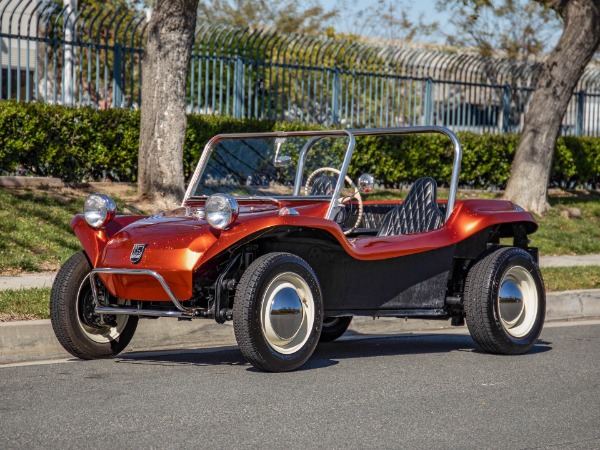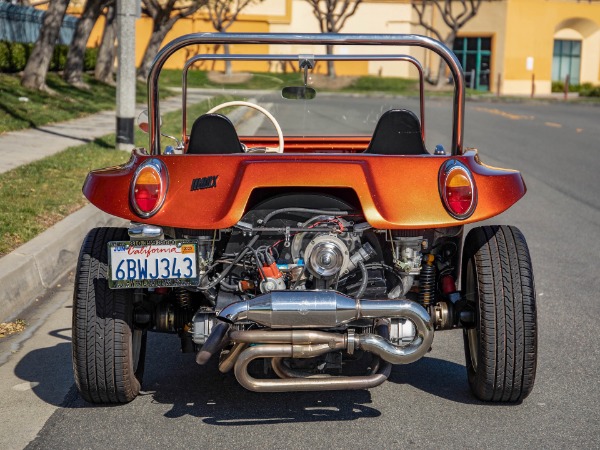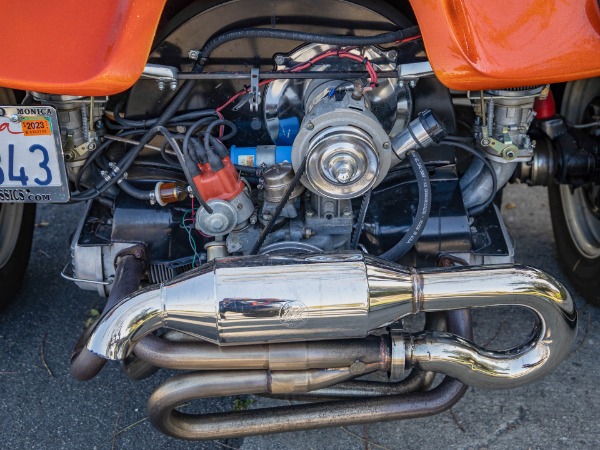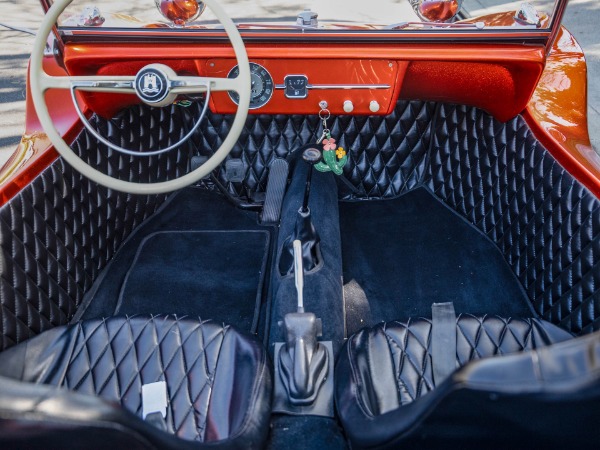 The Meyers Manx holds a rich and fascinating history, intricately woven with the stories of the people who played key roles in its creation and popularity.
The Meyers Manx holds a rich and fascinating history, intricately woven with the stories of the people who played key roles in its creation and popularity.
At the heart of the Manx’s origin is Bruce Meyers, an innovative and adventurous spirit with a passion for design and outdoor exploration. In the early 1960s, Meyers found inspiration in the emerging beach culture of Southern California, where dune buggies were gaining popularity. He saw an opportunity to create a vehicle that could embody the thrill of off-road driving and capture the essence of freedom and adventure.
Drawing upon his experience as a boat builder and surfer, Meyers set to work on his vision. He took a shortened Volkswagen Beetle chassis, known for its reliability and affordability, and designed a fiberglass body that would revolutionize the dune buggy industry. With its distinctive shape, featuring a rounded hood, sloping windshield, and flared fenders, the Manx had a unique aesthetic appeal that captured the imagination of enthusiasts.
In 1964, Meyers unveiled the first Meyers Manx prototype. Its lightweight construction, coupled with the Beetle’s rear-engine layout, made it nimble and agile on various terrains. The open-top design provided an exhilarating experience, allowing drivers and passengers to fully embrace the outdoors. The Manx quickly gained attention and soon became a symbol of the carefree and adventurous spirit of the era.
As the popularity of the Manx grew, so did the demand for these unique vehicles. To meet the increasing interest, Meyers established B.F. Meyers & Co., a company dedicated to manufacturing and selling Manx kits. These kits allowed enthusiasts to purchase the necessary components and assemble their own Manx using a Beetle chassis. It empowered individuals to customize their vehicles to suit their preferences and needs, further fueling the Manx’s popularity.
One of the influential figures associated with the Meyers Manx is Steve McQueen, the iconic American actor known for his love of automobiles and adventurous pursuits. McQueen’s affinity for the Manx elevated its status and brought it widespread recognition. He owned multiple Manx buggies and featured them prominently in his off-road adventures, solidifying their place in popular culture.
The Manx also attracted other notable owners, including celebrities like Frank Sinatra, Clint Eastwood, and Elvis Presley. The vehicle’s association with these high-profile individuals further contributed to its allure and cemented its status as a symbol of style and individuality.
Over the years, the Manx continued to evolve with various updates and improvements. Meyers introduced new versions, such as the Manx SR, featuring enhanced suspension and styling elements, and the Manxter, which offered a longer wheelbase for additional passenger space. The Manx DualSport combined the best of both on-road and off-road capabilities, appealing to a broader audience.
Beyond its recreational appeal, the Manx also made an impact in the world of motorsports. It competed in off-road races, demonstrating its durability and performance in challenging environments. The Manx’s success in racing further validated its capabilities and showcased its potential as a formidable off-road machine.
The enduring legacy of the Meyers Manx is evident in its continued popularity and influence in the automotive world. It sparked a wave of imitations and replicas, establishing the dune buggy as a recognized vehicle category. The Manx inspired countless enthusiasts to embrace the spirit of adventure and explore the outdoors in a unique and exciting way.
Today, the Manx remains an iconic symbol of the 1960s and 1970s counterculture. Its timeless design, combined with its association with freedom and self-expression, has made it a sought-after collector’s item. The Manx’s impact can also be seen in the broader off-road and recreational vehicle industry, where its influence paved the way for innovative designs and off-road capabilities.
The Meyers Manx is a testament to the vision, creativity, and passion of Bruce Meyers, whose desire to create a vehicle that embodied the joy of off-road driving left an indelible mark on automotive history. It stands as a symbol of the era’s spirit of adventure and continues to inspire generations of enthusiasts to explore the world with a sense of freedom and excitement.
Our 1970 VOLKSWAGEN MEYERS MANX # 312:

This particular 1970 Volkswagen Meyers Manx #312 is an exceptionally rare find, boasting an impressive level of originality and authenticity. With a mere 239 miles on the odometer, this Manx is a true survivor that has been certified by none other than Bruce Meyers himself, the creator of the iconic Manx.
The car comes with a Certificate of Authenticity, personally signed by Bruce Meyers, adding an extra layer of provenance and value. Its fiberglass body, a hallmark of the Manx design, remains in excellent condition, reflecting the high level of care and preservation it has received throughout the years.
Powering this Manx is a reliable and spirited flat 4-cylinder engine, delivering strong performance and a satisfying driving experience. The engine’s responsiveness is matched by a smooth-shifting 4-speed manual transmission, ensuring enjoyable gear changes and effortless acceleration.
Presented in the eye-catching Burnt Orange Metallic exterior finish, this Manx commands attention wherever it goes. Its distinctive appearance is further enhanced by the original diamond pleated Black color seats interior, creating a stylish and timeless cabin atmosphere.
Completing the authentic look are the painted steel wheels and chrome hubcaps, showcasing the classic Manx aesthetic. The car also comes with extra keys, adding a practical touch for the lucky owner.
As a rust-free example, this certified Bruce Meyers Manx represents the epitome of quality and originality. The engine’s reliable performance, smooth transmission, and cool running temperature ensure a pleasurable driving experience. This exceptional Manx is a rare gem, combining a unique history, iconic design, and outstanding condition into one remarkable package.

Click here to see our other Volkswagen inventory:
“Upon our recent acquisition of this remarkable 1970 Volkswagen Meyers Manx #312, we have taken the necessary steps to ensure its continued mechanical and cosmetic well-being. Although the car has not undergone a full-scale restoration, it has been attentively maintained and serviced over the years, addressing any issues as they arose.
To further ensure the car’s condition, we entrusted it to our local mechanic specialists, who conducted a thorough inspection. The car received a clean bill of health, confirming its excellent mechanical state. No signs of accidents or rust were detected, attesting to the car’s well-preserved nature.
With a remarkably low mileage of 239 miles, this Manx has likely spent its life under the care of conscientious owners who cherished and garaged it. Its occasional beach use adds a touch of adventure and further highlights its allure.
While the car’s cosmetic and mechanical history may not reflect extensive restoration work, its impeccable condition and the absence of any significant issues provide peace of mind and a testament to the care it has received. We are delighted to offer this rare and well-maintained Meyers Manx to discerning collectors and enthusiasts who appreciate its originality and timeless appeal.”
Looking to simply value or sell, trade or consign your classic Myers Manx? We can help. 310-399-3990 or info@westcoastclassics.com

